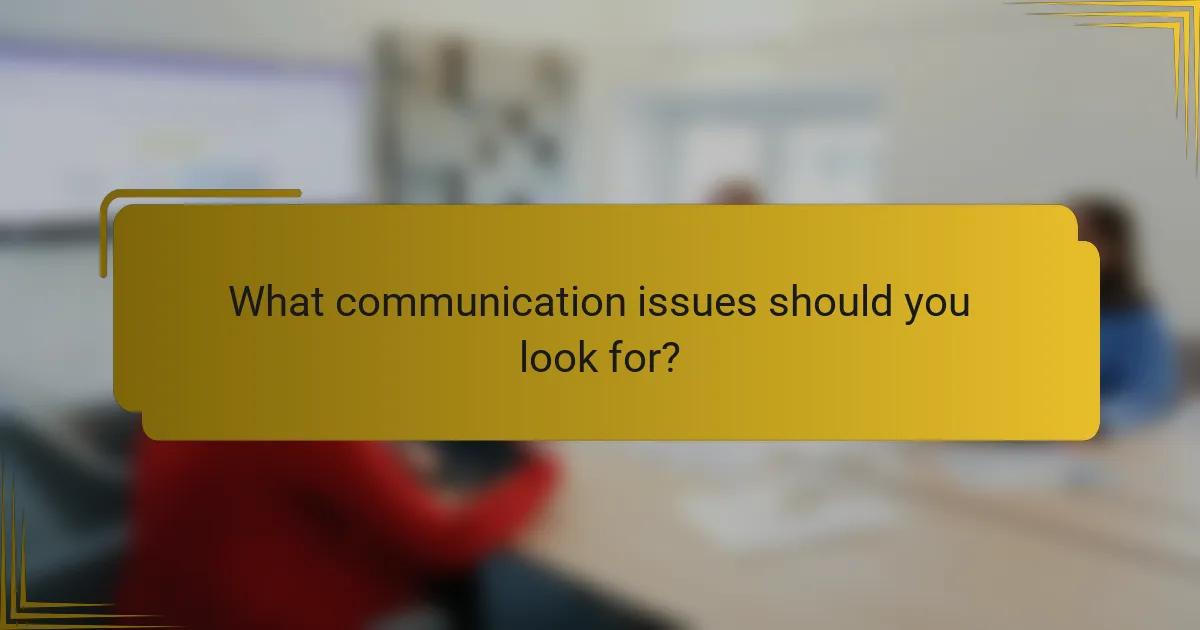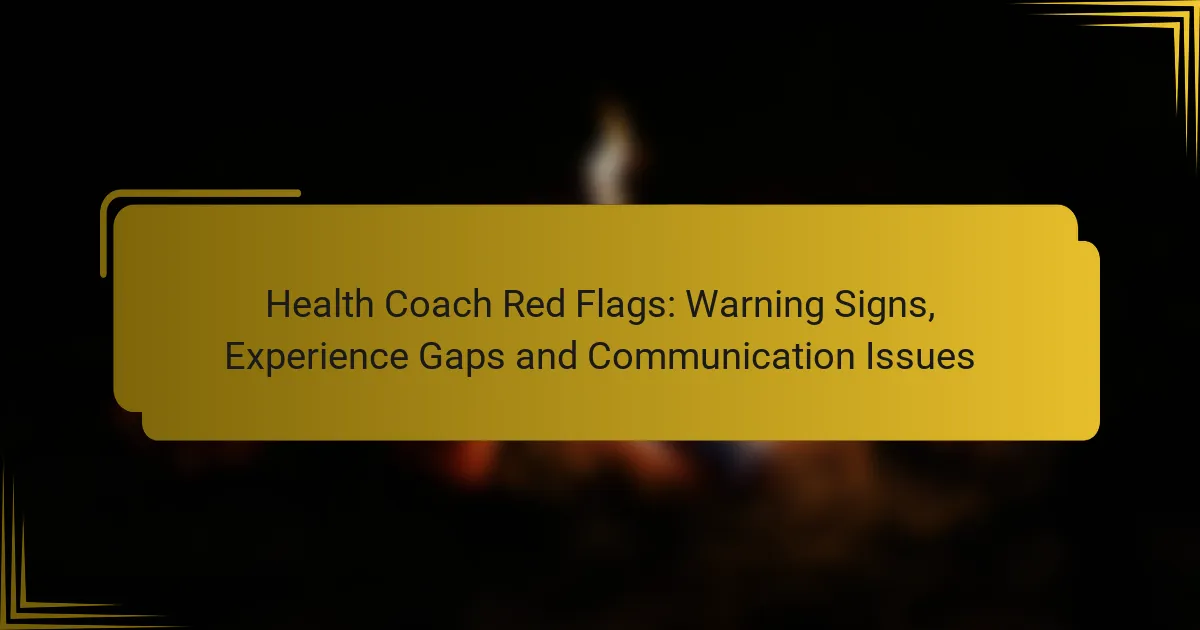Choosing the right health coach is essential for achieving your wellness goals, but it’s important to be aware of potential red flags. Warning signs such as a lack of certifications, poor communication, and inconsistent advice can indicate a coach who may not have your best interests at heart. Additionally, recognizing experience gaps and communication issues can help ensure you find a qualified professional committed to your success.

What are the warning signs of a bad health coach?
Warning signs of a bad health coach include a lack of proper certifications, poor communication skills, inconsistent advice, negative client reviews, and high-pressure sales tactics. Recognizing these red flags can help you choose a coach who is qualified and genuinely invested in your well-being.
Lack of certifications
A qualified health coach should possess relevant certifications from recognized organizations. These certifications demonstrate that the coach has undergone proper training and adheres to industry standards. Without these credentials, it’s difficult to trust their expertise.
When evaluating a coach, ask about their certifications and the institutions that issued them. Look for credentials from reputable bodies like the National Board for Health and Wellness Coaching or similar organizations in your country.
Poor communication skills
Effective communication is crucial for a successful coaching relationship. A coach who struggles to convey information clearly or listen to your concerns may hinder your progress. Pay attention to how they respond to your questions and whether they provide understandable explanations.
During initial consultations, assess their ability to articulate their coaching methods and strategies. If you find their communication unclear or dismissive, it may be a sign to look elsewhere.
Inconsistent advice
Inconsistent advice can create confusion and undermine your health goals. A good coach should provide guidance that aligns with established health principles and your personal needs. If you notice frequent changes in their recommendations, it may indicate a lack of knowledge or experience.
Keep track of the advice given during sessions. If it varies significantly without clear reasoning, consider discussing your concerns with the coach or seeking a second opinion.
Negative client reviews
Client reviews can offer valuable insights into a coach’s effectiveness and professionalism. Look for patterns in feedback, such as repeated mentions of poor results or unprofessional behavior. A few negative reviews may be normal, but a consistent trend is a red flag.
Check online platforms or social media for reviews. If a coach has a significant number of negative comments, it’s wise to consider other options.
High-pressure sales tactics
Coaches who use high-pressure sales tactics may prioritize profit over your well-being. If you feel rushed to sign up for packages or programs without adequate information, it’s a warning sign. A reputable coach should allow you to make informed decisions at your own pace.
Be cautious of coaches who emphasize urgency or offer limited-time deals that pressure you into commitment. A trustworthy coach will focus on building a relationship rather than pushing for immediate sales.

How can you identify experience gaps in a health coach?
Identifying experience gaps in a health coach involves examining their track record, areas of expertise, and commitment to professional development. Look for specific indicators that suggest a lack of depth in their coaching practice.
Limited client success stories
A health coach with experience gaps may struggle to provide a variety of client success stories. If their testimonials are few or lack detail, it could indicate limited effectiveness or a narrow client base.
When assessing success stories, consider the diversity of clients they have worked with. A coach who has helped clients from different backgrounds and with various goals is likely to have more comprehensive experience.
Unclear specialization areas
Experience gaps can also manifest as vague or overly broad specialization areas. A competent health coach should clearly define their niche, such as weight management, sports nutrition, or stress reduction.
To evaluate a coach’s specialization, ask specific questions about their training and expertise. If they cannot articulate their focus or provide relevant credentials, it may be a sign of insufficient experience.
Insufficient ongoing education
Health coaching is an evolving field, and a lack of ongoing education can indicate experience gaps. Coaches should regularly update their knowledge through workshops, certifications, or relevant courses.
Check if the coach is affiliated with recognized organizations that require continuing education. If they have not pursued additional training in recent years, it may suggest they are not keeping pace with industry standards.

What communication issues should you look for?
Identifying communication issues with a health coach is crucial for a successful partnership. Key signs include their ability to listen, the clarity of their responses, and their commitment to follow-up.
Inability to listen
A health coach who struggles to listen may miss important details about your goals and challenges. This can lead to ineffective strategies that do not address your specific needs. Pay attention to whether they ask clarifying questions or simply move on without acknowledging your concerns.
Effective listening is a two-way street; a good coach should reflect back what you say to ensure understanding. If you feel unheard, it may be a red flag indicating a lack of engagement in your coaching journey.
Vague responses to questions
Vague answers can signal a lack of expertise or confidence in a health coach. If they provide unclear or generalized responses to your specific inquiries, it may indicate they are not fully knowledgeable about the subject matter. Look for concrete examples or actionable advice instead of ambiguous statements.
For instance, if you ask about dietary recommendations and receive a broad suggestion like “just eat healthy,” it may be time to reconsider your choice. A competent coach should offer tailored guidance that aligns with your individual health goals.
Lack of follow-up
A health coach should regularly check in on your progress and adjust your plan as needed. If they fail to follow up after sessions or neglect to reach out for updates, it can reflect a lack of commitment to your success. Consistent follow-up is essential for accountability and motivation.
Consider setting expectations for follow-up communication at the beginning of your coaching relationship. This could include scheduled check-ins via email or phone calls to discuss your progress and any adjustments needed in your plan. If these do not occur, it may be a sign to seek a more engaged coach.

How to choose a qualified health coach?
Choosing a qualified health coach involves evaluating their credentials, experience, and communication style. A good health coach should have relevant certifications and a proven track record of helping clients achieve their health goals.
Check credentials and experience
Start by verifying the health coach’s qualifications. Look for certifications from recognized organizations, such as the National Academy of Sports Medicine (NASM) or the American Council on Exercise (ACE). These credentials ensure that the coach has undergone proper training and adheres to industry standards.
Experience is equally important. A coach with several years of practice is likely to have encountered a variety of client situations and can offer more tailored advice. Consider asking about their specific areas of expertise, such as weight management, nutrition, or fitness training.
Assess communication style
Effective communication is crucial for a successful coaching relationship. Observe how the coach interacts with you during initial consultations. They should listen actively, ask insightful questions, and provide clear, actionable feedback.
Consider whether their communication style aligns with your preferences. Some clients may prefer a more direct approach, while others might benefit from a supportive and empathetic style. Finding a coach whose communication resonates with you can enhance your overall experience.
Request client testimonials
Client testimonials offer valuable insights into a coach’s effectiveness and approach. Ask potential coaches for references or reviews from previous clients. Positive feedback can indicate a coach’s ability to motivate and support clients in achieving their health goals.
Look for testimonials that detail specific outcomes, such as weight loss, improved fitness levels, or enhanced well-being. This information can help you gauge whether the coach has a successful track record and if their methods align with your objectives.

What are the potential risks of hiring an unqualified health coach?
Hiring an unqualified health coach can lead to significant risks, including worsening health conditions, ineffective advice, and potential financial loss. These coaches may lack the necessary training and knowledge to provide safe and effective guidance, which can jeopardize your health and wellness journey.
Worsening health conditions
One of the primary risks of engaging with an unqualified health coach is the potential for worsening health conditions. Without proper expertise, a coach may recommend inappropriate diets, exercise regimens, or supplements that could exacerbate existing health issues.
For instance, someone with diabetes might receive advice that fails to consider their blood sugar management, leading to dangerous fluctuations. It is crucial to ensure that any health coach you consider has a solid understanding of medical conditions and how they interact with lifestyle changes.
To avoid this pitfall, always verify a coach’s qualifications and ask about their experience with specific health conditions. Look for certifications from recognized organizations and consider seeking recommendations from healthcare professionals.
